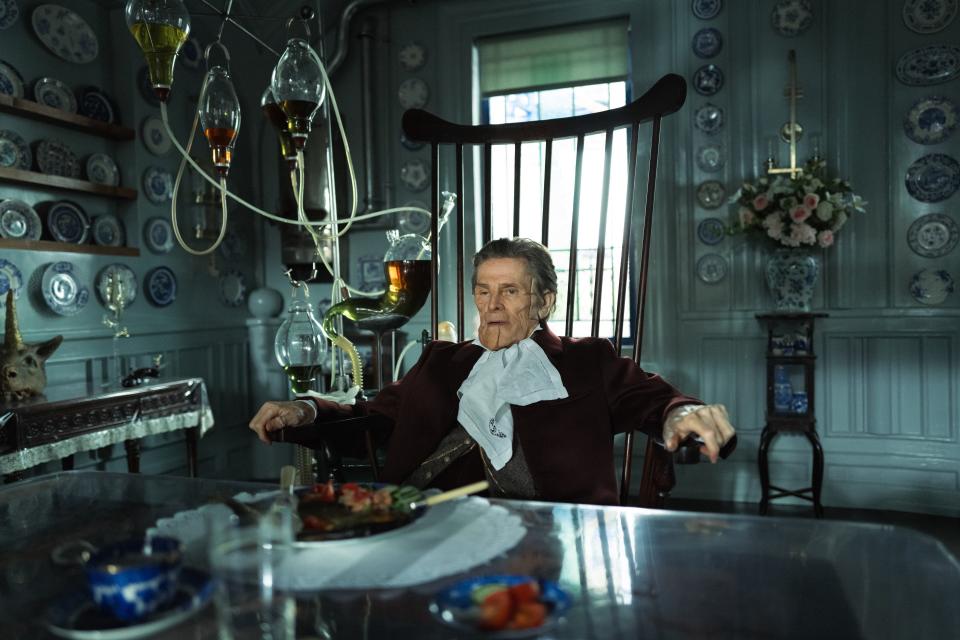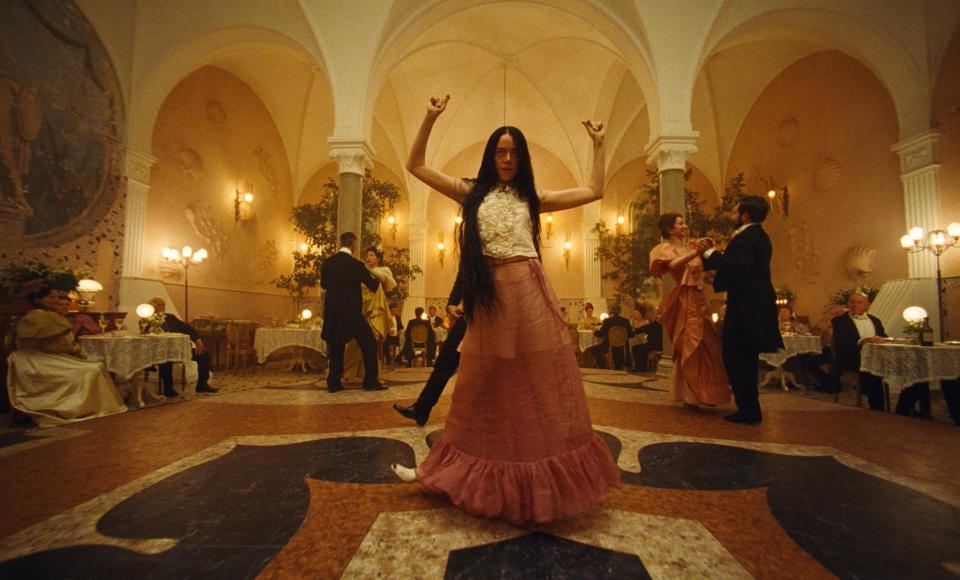Emma Stone fuels 'Poor Things,' an absurdist mix of sex, pastries and 'Frankenstein'
- Oops!Something went wrong.Please try again later.
- Oops!Something went wrong.Please try again later.
Sure, Emma Stone can sing and dance, but in the absurdist “Poor Things” she's a joyous sight childishly banging utensils on a dinner table, wolfing down tarts and finding sweaty carnal passion in a French bordello.
The Oscar-winning actress reteams with “The Favorite” director Yorgos Lanthimos for this weirdly wonderful Victorian-era coming-of-age tale, adapted by Tony McNamara (“The Great”) from the 1992 Alasdair Gray novel. The lusty dark comedy (★★★½ out of four; rated R; in theaters Friday) is a fantastical, feminist spin on Mary Shelley’s “Frankenstein” that explores a woman’s liberation, sexual awakening and burgeoning empathy with a mix of whimsy, grand adventure and mad science.
Disfigured Scottish surgeon Godwin Baxter (Willem Dafoe) hires his student Max (Ramy Youssef) to “meticulously” note the progression of his latest experiment: God, as the doctor is called, has reanimated a woman named Bella Baxter (Stone) with the brain of an infant. Her mental age needs time to sync with her body, which is why, when Max meets her, Bella waddles like a toddler and says “ba” instead of “bye.” (God also lets Bella play with a corpse, as she giddily goes to town with a scalpel on eye sockets and yelling “Squish!”)

God is an overprotective father figure, though, and the fact that he doesn’t let Bella go outside doesn’t fly with her increasingly independent streak. The scientist convinces Max to propose marriage to Bella, with the legal caveat that they live in God’s over-the-top estate alongside the hybrid chicken dogs and rooster pigs. But Bella, soon after discovering the joys of masturbation, meets rakish attorney Duncan Wedderburn (Mark Ruffalo), who convinces her to go on an international romp before tying the knot.
Duncan and Bella first hit up Lisbon, where even though she likes the sex (which she calls "furious jumping"), the quickly maturing woman tires of her faux beau’s alpha-male idiocy and heads out on her own, discovering the wonders of pastries and dancing. Her next stop is a cruise ship, where Bella learns about the cruelty of people, and the bickering couple then lands in Paris, where Bella finally dumps the pompous attorney and becomes a prostitute. Duncan rages at Bella for this employment choice, but she defiantly tells him, “We’re our own means of production.”

The biggest hoot in “Poor Things” is witnessing the modern-thinking Bella as a filter-free force of nature in such a patriarchal period: She causes fits for all the controlling men in her life – some mean well, others are more domineering – but Bella will not be denied, especially during a revelatory final act driving home her insistence that she will never let herself be imprisoned.
Stone's ability to reach that emotional place, after starting off in an infantile state, is phenomenal (and puts her in the pole position for another best actress Academy Award). The loss of Bella’s virginity is a turning point – the movie even transitions from black-and-white to vivid color in the middle of some thrusting – yet with both physicality and line delivery, Stone evolves this refreshing character with every new experience.
'SNL': Tina Fey welcomes Emma Stone into Five-Timers Club

She receives stellar support from Dafoe, whose enjoyably complex doctor sports a “Frankenstein”-style patchwork body born from parental abuse, and Ruffalo, a comedic gift as the boorish and extremely punchable Duncan. Kathryn Hunter lends a bizarre charm to the eccentric Madame Swiney, the brothel owner who views Bella as both person and commodity, while Christopher Abbott is a nice addition later in the film as Alfie, another dude who wants to put Bella under his thumb.
Tackling the fine line between mankind and monsters, McNamara’s script crackles with humor and nuance as Bella ultimately returns home to face loved ones and her past. “Poor Things” is also a technically amazing achievement, from eye-popping costumes and Jerskin Fendrix’s fittingly kooky score to impressive production design and a style at once reminiscent of Terry Gilliam and Stanley Kubrick, albeit with Lanthimos’ signature weirdness.
Whether he's playing with off-kilter romance in “The Lobster” or leaning into slapstick period farce for “The Favorite,” Lanthimos consistently manages to blend contemporary themes with the intellectually inventive. As Swiney notes, “A woman plotting her course for freedom: How delightful.”
And thanks to Stone, it’s memorably so.
This article originally appeared on USA TODAY: 'Poor Things' movie review: Emma Stone's feminist 'Frankenstein' fable

